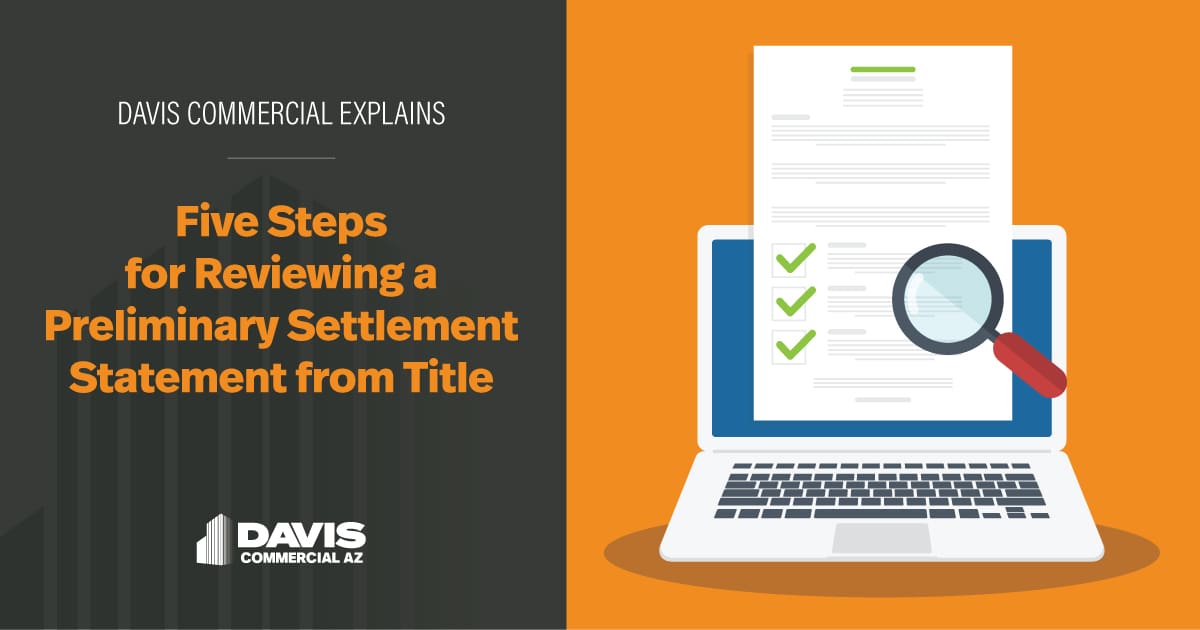Five Steps for Reviewing a Preliminary Settlement Statement from Title

When you are purchasing or investing in commercial real estate, whether it be a building or land, getting through the closing process can be daunting. Fear not! If you understand the process and what to expect, it can help overcome any potential fatigue and get you over the last hurdle.
One to two weeks before the close of escrow, the title company prepares a preliminary settlement statement or closing statement that summarizes all the buyer’s and seller’s costs in the real estate transaction. One column is for the buyer’s debit and credit expenses and one column is for the seller’s debit and credit expenses. The main objective of the settlement statement is to outline all the expenses related to the transaction, which includes the loan agreement details. The settlement statement includes the seller’s loan payoff amount, if applicable, the buyer’s new loan amount and fees, and commissions. It also outlines title charges, governmental recordings, transfer fees and tax and HOA prorations, etc. Additionally, if there is a tenant in place, the settlement accounts for any rent paid in advance and the tenant’s security deposit.
During the review period, the debtor must examine all the information as there may be missing details or something that needs correcting or changing. Review the legal settlement statement carefully. Mistakes are common, mostly because of a part of the agreement that the title company is not aware of. Enlist the help of your real estate professional, attorney and/or title or escrow officer to iron out any issues and ensure all questions are answered ahead of signing the final settlement statement. Meanwhile, the lender will confirm there are no last-minute fees or problems associated with the property.
The five steps below serve as a guideline when reviewing a settlement statement:
- Verify the accuracy of the information: Check that all information on the settlement statement is accurate, including the purchase price, closing costs, loan amount, and any credits or debits including property taxes. If you discover any discrepancies, alert your title company.
- Review the loan details: If you are taking out a mortgage to finance the property, review the loan details to ensure that the interest rate, loan amount, and other terms are correct. Make sure that any loan fees are clearly disclosed, and that the lender has provided all the necessary documentation. Errors on the settlement statement may be corrected before closing, but the loan amount and interest rate cannot change unless there is a change in circumstances.
- Check for errors or discrepancies: Look for any errors or discrepancies on the settlement statement, such as incorrect amounts or charges for services that were not provided. If any errors are found, notify the appropriate party immediately.
- Verify the prorations: Prorations are adjustments made to the settlement statement for items such as property taxes, HOA fees, and rent payments from existing tenant agreements. Verify that all prorations are correct and that there are no charges for expenses that should be paid by the seller.
- Confirm the distribution of funds: Review the distribution of funds section of the settlement statement to ascertain that all funds are being disbursed correctly. If there is a tenant, make sure their security deposit is part of the distribution of funds. Confirm that all parties involved in the transaction are being paid the correct amounts and that any outstanding debts or liens are being paid off as agreed.
Title agencies play a crucial role in safeguarding an effective closing process, but it’s always good to educate yourself as well. By following these steps, you can rest assured knowing that your settlement statement is accurate and that there are no surprises at closing. Once all parties are in agreement with the settlement statement, the closing can proceed.
You can learn more about the settlement statement, including the five areas that are most often miscalculated, in my newest book Simply Own It! The American Dream.
If you are looking to team up with a commercial real estate buyer rep in the search for your first or next commercial real estate purchase, Davis Commercial AZ embraces the opportunity to earn your business. Our team of professionals is well-versed in the Arizona real estate market and has excellent relationships with title agencies, lenders and other professionals needed for a successful property closing. Get in contact here and let’s realize your dream, together.
Related Posts

TSMC, California Relocations & Phoenix Commercial Real Estate Growth
Phoenix commercial real estate continues to attract national attention as major employers and corporate relocations…

Why a Build-To-Suit May Be a Smart Choice for Businesses
Elevated interest rates, selective lending and mixed signals in national headlines have created confusion about…

1031 Tax Deferred Exchanges Explained: Maximizing Returns
As businesses grow and operations evolve, so do their property needs. The need for new…

Retail Versus Office Investments: What Investors Need to Know
Not all commercial real estate properties are created equal. Whether you’re eyeing a retail center…
